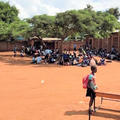THE IMPACT OF SCHOOL LEADERSHIP TRAINING ON IMPROVING TEACHER BEHAVIOURS AND STUDENT ACHIEVEMENT
The introduction of free primary education in Malawi has led to a rapid rise in student enrolment, in line with trends in other sub-Saharan African countries. Schools have struggled to keep up with the rise in student numbers resulting in a dip in educational quality and performance with schools facing poor distribution of teachers, large class sizes, and high rates of repetition and dropouts in lower grades. The research team are working to gain a better understanding of the school context in Malawi with a focus on school leadership.
OUR AIMS
Can student progression and students' test scores improve as a result of a custom-designed multi-phase school leadership training programme?
Malawi's primary schools struggle to provide students with quality education. Enrolment in primary schools rose rapidly after the introduction of free primary education in 1994, attaining universal primary enrolment by the early 2000s. In 1994 only 1.6 million of Malawi's children were enrolled in primary school, but by 2016 the figure had reached 4.8 million. However, the education system has failed to keep pace with increased enrolments, resulting in overcrowded classrooms. Under-staffed schools have led to high dropout and repetition rates, with Malawi finishing near the bottom in regional assessments of English, Mathematics and Science competencies for Standard 6.
This project aims to conduct a training intervention to improve the capacity of school leaders to conduct key activities in three key channels:
- Utilisation of resources.
- Managing teacher behaviour.
- Building inclusive school cultures for all students, particularly: over-aged students, low performing students, students with special educational needs, and girls.
ABOUT THE PROJECT
This project's intervention consisted of a multi-phase programme to strengthen leadership skills for head teachers, deputy head teachers, and PEAS. It included both classroom training and follow-up visits to schools to measure changes in practices and behaviours, and to inform a refresher phase of training conducted a year after the main training.
The intervention was developed by a consortium of the Ministry of Education of Malawi and consisted of three main phases:
- Main training (10 days of intensive classroom training)
- Follow-up visits (three visits around two to six months after the initial training).
- Refresher training (three days worth of classroom training focused on areas identified as having seen limited improvement in the follow-up visits and by a third-party monitoring firm.
The project employs a randomised controlled trial design. Schools were assigned randomly, at the school level, to the treatment or control group from schools across the country.
RESULTS
The results show that exposure to the intervention produced significant improvements in mathematics test scores for a sample of students, equivalent to approximately 0.1 S.D or eight weeks worth of learning. Researchers also find that the treatment significantly reduced repetition of lower grades.
The findings suggest that improvements in school leadership can be achieved in a low-income context, with Government implementation and at scale, through a multi-phase intervention combining classroom training with follow-up visits and refresher training. These improvements can ultimately lead to improvements in student test scores and progression.









